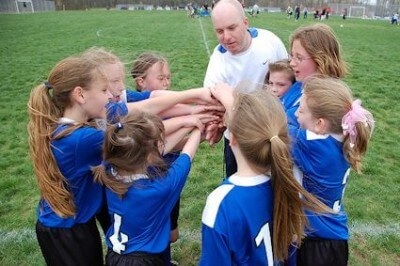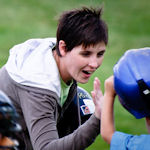Coaches: Key Players in Youth Sports
 Everyone talks about great coaches — and for good reasons.Coaches are key players in making sports experiences enjoyable and gratifying for youth. Not only do coaches help kids have fun but they also play an important role in positive youth development.Good coaches help individuals and teams win. But that is only part of their jobs. While they deservedly celebrate the winners, they also recognize the efforts of all children who work hard to be good in sports. Coaches’ help kids develop resilience, cope with disappointment, learn from mistakes, and make adjustments to strategies. These are all important aspects of developing initiative, an ability that children use in all aspects of life.
Everyone talks about great coaches — and for good reasons.Coaches are key players in making sports experiences enjoyable and gratifying for youth. Not only do coaches help kids have fun but they also play an important role in positive youth development.Good coaches help individuals and teams win. But that is only part of their jobs. While they deservedly celebrate the winners, they also recognize the efforts of all children who work hard to be good in sports. Coaches’ help kids develop resilience, cope with disappointment, learn from mistakes, and make adjustments to strategies. These are all important aspects of developing initiative, an ability that children use in all aspects of life.
3 Roles of Good Coaches
Researchers have studied the role of coaches in youth sports for many years. They have learned that coaches who give positive reinforcement, provide effective feedback, and foster a caring climate provide the best developmental outcomes for children.
Provide Positive Reinforcement
Positive reinforcement is used by coaches to bring about desirable changes in behavior and to teach children to take responsibility for their actions. Coaches do this in a variety of subtle and overt ways. Sometimes it is a gesture, like a nod of a head, a smile, or a pat on the back that lets players know they performed well. Other times, it may be verbal praise for trying hard, executing a good strategy, or treating another player with respect. Praise is most effective when it makes players feel good about who they are on the inside. For example, even when children lose, they can still feel good about how hard they worked or how their abilities have grown.
Give Effective Feedback
Good coaches are always looking for teachable moments. They facilitate a growth mindset in their players, showing them that everyone can change and grow through learning. One technique used by coaches is to serve up a feedback sandwich. 1) They begin with identifying something positive. For example, “Rob, I really liked the way you pushed yourself during the game.” 2) They coach for improvement, being direct and firm but never demeaning. For example, “I’m going to work with you on how to kick the ball more successfully….” 3) They end with encouragement, stating a bright outlook for the future. This technique works well with children, particularly when coaches regularly monitor change and continue giving helpful feedback as improvement occurs.
Create a Caring Climate
 One of the most positive aspects of kid’s sports is that they have regular contact with a caring adult. When coaches truly care for their athletes, they form a bond between themselves and their team that give members a sense of belongingness. Research shows that when kids feel like they belong, their attendance, motivation, and retention increase. Elements of caring include listening, empathizing, respect, and acceptance — regardless of winning. Modeling these behaviors to children has been shown to foster their ability to care for themselves and others and also ignites a passion for learning.
One of the most positive aspects of kid’s sports is that they have regular contact with a caring adult. When coaches truly care for their athletes, they form a bond between themselves and their team that give members a sense of belongingness. Research shows that when kids feel like they belong, their attendance, motivation, and retention increase. Elements of caring include listening, empathizing, respect, and acceptance — regardless of winning. Modeling these behaviors to children has been shown to foster their ability to care for themselves and others and also ignites a passion for learning.
When young people rate their participation in sports compared to other after-school activities, like arts, academic interests, community service, and faith-based activities, sports gets mixed grades. Why? Sports are often over-focused on winning and competition and under-focused on developing internal strengths like empathy, respect, and caring.
Adolescents score sports high in giving them opportunities to develop teamwork and social skills but low in opportunities to experience positive relationships with adults and peers or learning how to help others. Since studies maintain one of the most important experiences we can give kids is to help them become caring adults, it seems imperative that coaches focus on creating caring environments that teach respect and how to develop positive relationships. If young people perceive this caring environment, they are more likely to feel connected and demonstrate caring behaviors to others.
Coaches may have winning on their minds but it is those who nurture positive youth development that end up with children who succeed in life.



